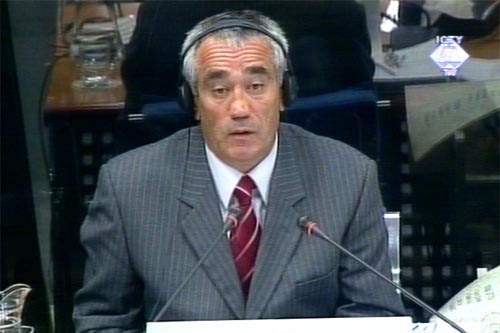Home
"FEAR KEEPS THE HOUSE SAFE"
In 1995, Kosovo was "the safest place in Serbia", Slobodan Milosevic claims, adding that Pristina was the safest town for the Serbian "students and girls". In his cross-examination, General Djosan denies that the troops were deployed in Kosovo to "intimidate the population”
 Milos Djosan, defense witness for Milosevic
Milos Djosan, defense witness for Milosevic According to the notes from a meeting of the Supreme Defense Council of 13 April 1995 – that prosecutor Nice quoted today – the then Serbian president Slobodan Milosevic said Kosovo was "the safest place" in Serbia. He illustrated the point by saying that 9,000 students had been sent to study at the Pristina University and noting that "girls from Serbia can walk the streets of Pristina at night alone". Yet, Milosevic concluded, "it's a good thing they are there, that this is functioning, because everyone knows fear keeps the house safe".
The "they" that were there to instill fear to keep the house safe were the Yugoslav Army troops. Milosevic's words were preceded by his discussion with Momcilo Perisic, the then Chief of General Staff, about the forces that could be counted on if any conflicts with the terrorists broke out in "the safest place in Serbia". Apart from 130,000 of "his men" – VJ troops – Perisic could count on "100,000 police who would be operating together with the military", as Milosevic explained to him.
Milosevic then gives the example of Djakovica, describing it as "the most beautiful, the richest and the best organized town in Kosovo, the town in which the Siptar terrorists have invested the most". On a hill dominating the town, he tells Perisic, there is an abandoned barracks. A motorized unit of the VJ amour should be stationed there, to let the "Siptar terrorists" know that the military was there and that their riches would be destroyed if anything untoward happened. Because, as Milosevic said, "it is a well-known fact that fear keeps the house safe".
The prosecutor quoted this extract during his cross-examination of the retired general Milos Djosan, who commanded the Djakovica garrison in 1998 and 1999. His headquarters were in the barracks looking over the town. Of all the things Milosevic had said at the session of the Supreme Defense Council, his defense witness agreed only with the statement that "it is out of the question" that there were 100,000 police in Serbia or that the troops were deployed in Djakovica to "intimidate the population" with their presence, or to keep the house safe by instilling fear.
According to the indictment and the testimony of prosecution witnesses, as soon as the NATO air strikes began on 24 March 1999, a wave of violence was launched against the Albanian population. Houses and businesses were burned and civilians were expelled and killed. The witness either denies the allegations or claims those were the consequences of NATO air strikes and the operation of "Siptar terrorist forces". When asked by the prosecutor whether it was his testimony that "none of that ever happened", the witness reluctantly replied that "there were instances of arson" and that he "is not claiming there was no looting". Although he addressed the general situation in Kosovo in 1999 in his answers to Milosevic's questions last week, when today the prosecutor put it to him that his testimony in fact referred only to his unit and what he personally had seen or heard, Djosan agreed with him.
As today's session drew to a close, Milosevic began his re-direct examination of the witness.
Linked Reports
- Case : Milosevic Slobodan - "Kosovo, Croatia and Bosnia"
- 2005-10-20 GENERAL DOESN’T CARE WHO'S PAYING HIM
- 2005-10-20 MILOSEVIC HAS 106 HOURS TO PRESENT HIS EVIDENCE
- 2005-10-19 GENERAL VS. CAPTAIN
- 2005-10-26 THE CRIMES "DID NOT HAPPEN" OR "WERE NOT CRIMES AT ALL"
- 2005-10-27 NATO’S KOSOVO CONSPIRACY
- 2005-10-31 CLEANSING: WHAT IS IT?
